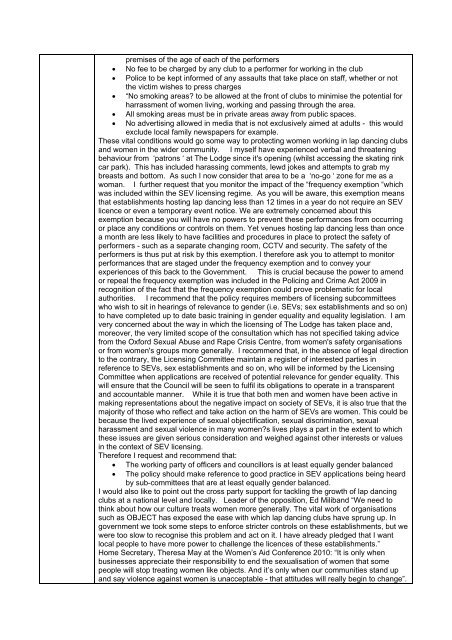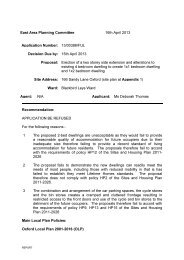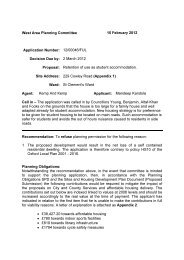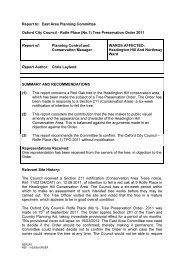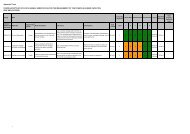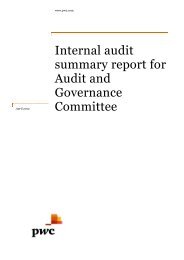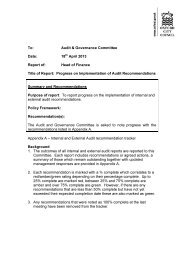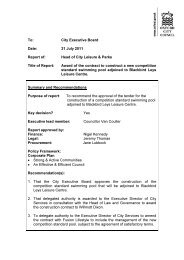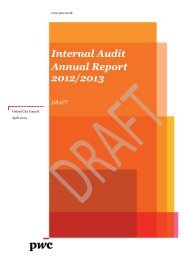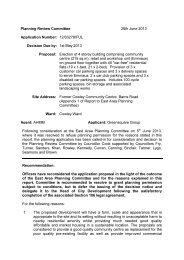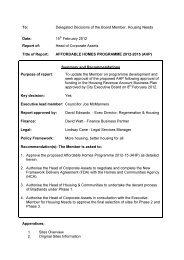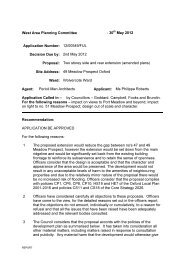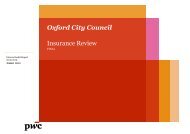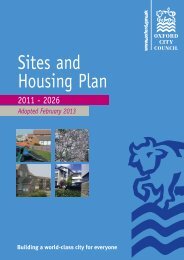Draft Sex Establishment Policy - Appendix , item 11. PDF 8 MB
Draft Sex Establishment Policy - Appendix , item 11. PDF 8 MB
Draft Sex Establishment Policy - Appendix , item 11. PDF 8 MB
Create successful ePaper yourself
Turn your PDF publications into a flip-book with our unique Google optimized e-Paper software.
premises of the age of each of the performers<br />
• No fee to be charged by any club to a performer for working in the club<br />
• Police to be kept informed of any assaults that take place on staff, whether or not<br />
the victim wishes to press charges<br />
• “No smoking areas to be allowed at the front of clubs to minimise the potential for<br />
harrassment of women living, working and passing through the area.<br />
• All smoking areas must be in private areas away from public spaces.<br />
• No advertising allowed in media that is not exclusively aimed at adults - this would<br />
exclude local family newspapers for example.<br />
These vital conditions would go some way to protecting women working in lap dancing clubs<br />
and women in the wider community. I myself have experienced verbal and threatening<br />
behaviour from ‘patrons ‘ at The Lodge since it's opening (whilst accessing the skating rink<br />
car park). This has included harassing comments, lewd jokes and attempts to grab my<br />
breasts and bottom. As such I now consider that area to be a ‘no-go ‘ zone for me as a<br />
woman. I further request that you monitor the impact of the “frequency exemption “which<br />
was included within the SEV licensing regime. As you will be aware, this exemption means<br />
that establishments hosting lap dancing less than 12 times in a year do not require an SEV<br />
licence or even a temporary event notice. We are extremely concerned about this<br />
exemption because you will have no powers to prevent these performances from occurring<br />
or place any conditions or controls on them. Yet venues hosting lap dancing less than once<br />
a month are less likely to have facilities and procedures in place to protect the safety of<br />
performers - such as a separate changing room, CCTV and security. The safety of the<br />
performers is thus put at risk by this exemption. I therefore ask you to attempt to monitor<br />
performances that are staged under the frequency exemption and to convey your<br />
experiences of this back to the Government. This is crucial because the power to amend<br />
or repeal the frequency exemption was included in the Policing and Crime Act 2009 in<br />
recognition of the fact that the frequency exemption could prove problematic for local<br />
authorities. I recommend that the policy requires members of licensing subcommittees<br />
who wish to sit in hearings of relevance to gender (i.e. SEVs; sex establishments and so on)<br />
to have completed up to date basic training in gender equality and equality legislation. I am<br />
very concerned about the way in which the licensing of The Lodge has taken place and,<br />
moreover, the very limited scope of the consultation which has not specified taking advice<br />
from the Oxford <strong>Sex</strong>ual Abuse and Rape Crisis Centre, from women's safety organisations<br />
or from women's groups more generally. I recommend that, in the absence of legal direction<br />
to the contrary, the Licensing Committee maintain a register of interested parties in<br />
reference to SEVs, sex establishments and so on, who will be informed by the Licensing<br />
Committee when applications are received of potential relevance for gender equality. This<br />
will ensure that the Council will be seen to fulfil its obligations to operate in a transparent<br />
and accountable manner. While it is true that both men and women have been active in<br />
making representations about the negative impact on society of SEVs, it is also true that the<br />
majority of those who reflect and take action on the harm of SEVs are women. This could be<br />
because the lived experience of sexual objectification, sexual discrimination, sexual<br />
harassment and sexual violence in many womens lives plays a part in the extent to which<br />
these issues are given serious consideration and weighed against other interests or values<br />
in the context of SEV licensing.<br />
Therefore I request and recommend that:<br />
• The working party of officers and councillors is at least equally gender balanced<br />
• The policy should make reference to good practice in SEV applications being heard<br />
by sub-committees that are at least equally gender balanced.<br />
I would also like to point out the cross party support for tackling the growth of lap dancing<br />
clubs at a national level and locally. Leader of the opposition, Ed Miliband “We need to<br />
think about how our culture treats women more generally. The vital work of organisations<br />
such as OBJECT has exposed the ease with which lap dancing clubs have sprung up. In<br />
government we took some steps to enforce stricter controls on these establishments, but we<br />
were too slow to recognise this problem and act on it. I have already pledged that I want<br />
local people to have more power to challenge the licences of these establishments.”<br />
Home Secretary, Theresa May at the Women’s Aid Conference 2010: “It is only when<br />
businesses appreciate their responsibility to end the sexualisation of women that some<br />
people will stop treating women like objects. And it’s only when our communities stand up<br />
and say violence against women is unacceptable - that attitudes will really begin to change”.


